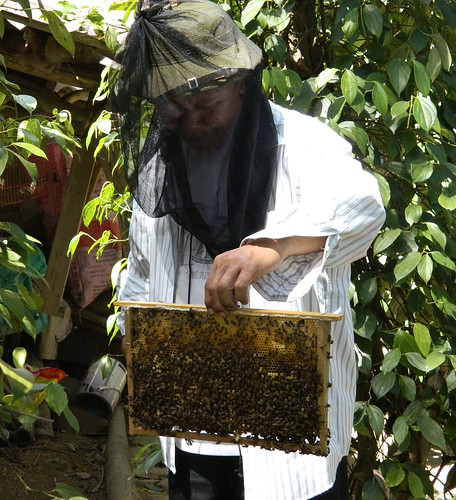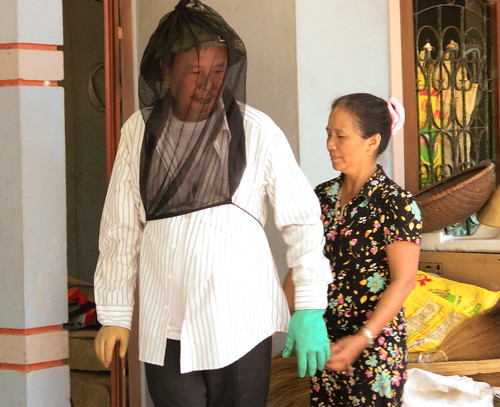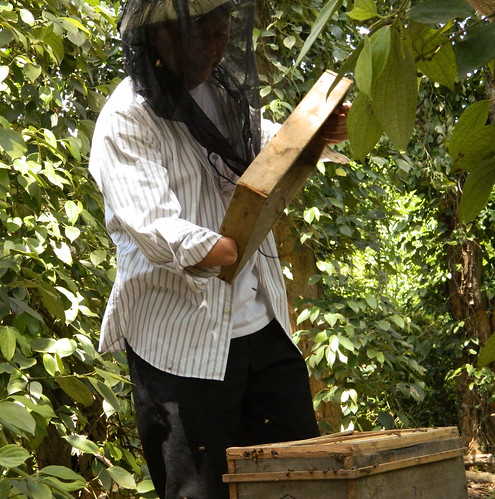“If a man has no chance of obtaining work he is in a desperate position, not simply because he lacks an income but because he lacks this nourishing and enlivening factor of disciplined work which nothing can replace”
The above quote is from one of my favorite books of all time, Small is Beautiful by E.F Schumacher. This particular quote comes from his essay “Buddhist Economics”, where he outlines his ideal economic system that conforms to a Buddhist world view. One of the main points of his work is that labor shouldn’t be a robotic series of movements where workers are paid as little as possible so producers can maximize profits. Work should first and foremost allow people to exercise their faculties and creativity, join people together in a common task to overcome their own egos, and produce goods and services to live a comfortable existence. AEPD’s economic empowerment model seems to follow this idea very closely, attempting to connect their beneficiaries with meaningful employment where they can both support their families and also take pride in their labor. This became quite evident during my latest excursion to the Bo Trach district of Quang Binh.
AEPD supports many different business models for their beneficiaries, but one that particularly caught my attention was beekeeping. I guess I was curious about this because of the fairly recent phenomenon of colony collapse disorder, where honey bees seem to be vanishing in parts of Europe and North America. So I was particularly excited for this trip to the field where I would meet Mr. Phong, an apiculturist who I was told had a strong reputation in the area, and even earned the moniker of “The King Beekeeper”. Nicknames like the King are usually well earned, so maybe the King could shed some light into our disappearing bee problem.
I was half expecting to be immediately engulfed by an irate swarm of insects upon entering Mr. Phong’s home, but this of course didn’t happen. His house is peaceful and serene, and he was a more than gracious host. Mr. Phong, like many of AEPD’s clients is a landmine survivor, who lost part of his right arm during the American war (he wasn’t reluctant to talk about his injury, but I got the impression he was a man who mostly thought about the future, not dwelling on the past). Unable to continue his work as a farmer to support his family, he turned to beekeeping, which is a traditional business in his hometown.
Lacking the necessary funds to start this new venture, AEPD was there to provide him with much needed capital and paid for the costs for his training. Before AEPD’s support, he didn’t have any full hives in his colony. AEPD provided him with the materials to support 3 bee hives, which he then turned into 36 hives in less than 6 months. In a good month, he can collect 30 liters of honey, selling them for 350,000 VND per liter. That’s equivalent to about $500 US a month, which is very high for this area. Not only has he become a successful businessman, he’s someone who commands great respect in the community. He’s the manager of a support group for persons with disabilities, and also heads the association of beekeepers for the Quang Binh Province. He’s regularly consulted by various Commune People Committees (CPC’s) so they can establish their own apiculture farms. He is also a regular guest lecturer in neighboring provinces, imparting his knowledge and experience to aspiring beekeepers.
I was curious to get Mr. Phong’s opinion on Colony Collapse Disorder, but he was unfamiliar with the problem. He told me nothing like that has happened to him or any other beekeepers in Vietnam that he knew of. Hives can become weak for a number of factors he explained, but there must be outside factors causing these problems. I asked him if changes in the environment could be a cause, and he suggested that’s most likely the case. “Bees prefer a pure environment. I know some people in the west use chemicals a lot, but I’ll never use them.” He even described a natural method to encourage the production of queen bees to create new hives, where he uses ants to burrow into the colony to create a larger crevice where eggs are stored. This encourages the queen to produce more offspring, and will likely cause the birth of a new queen. Judging from the success of his thriving bee yard, this natural method may be the way to go. A recent article from the Guardian outlines the challenges facing the bee population, and seems to agree with Mr. Phong’s assessment. Check it out here.
After our discussion, Mr. Phong let us sample some fresh honey as well as some homemade rice and honey wine that he makes. One my colleagues enjoyed it so much she bought a liter to take home. Mr. Phong seems to have truly found his niche. He’s a successful business man who’s able to live well, and takes tremendous pride in his work. He is constantly giving back to the community, giving free training and often sharing hives with other persons with disabilities in the area. He’s a man of great generosity and determination, and I think I understand how he earned his illustrious nickname.
Posted By Ryan McGovern (Vietnam)
Posted Jun 23rd, 2011





2 Comments
Karin
June 26, 2011
Ryan, what an excellent blog describing the survivorship and determination of one man. Does AEPD provide microloans?